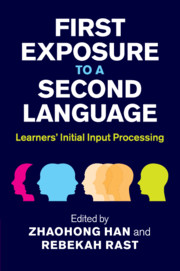
-
Select format
-
- Publisher:
- Cambridge University Press
- Publication date:
- 05 October 2014
- 29 September 2014
- ISBN:
- 9781139084390
- 9781107017610
- 9781108810418
- Dimensions:
- (228 x 152 mm)
- Weight & Pages:
- 0.43kg, 220 Pages
- Dimensions:
- (229 x 152 mm)
- Weight & Pages:
- 0.35kg, 222 Pages
- Subjects:
- Applied Linguistics, Language and Linguistics
You may already have access via personal or institutional login- Subjects:
- Applied Linguistics, Language and Linguistics
Book description
The initial state of learner spontaneous input processing in foreign language learning, as well as the extent to which this processing leads to intake, is of central importance to theoreticians and teachers alike. In this collection of original studies, leading experts examine a range of issues, such as what learners do when faced with a language they know little or nothing about, what factors appear to mediate beginning learners' processing of input, how beginners treat two types of information - form and meaning - in the input, and how adult cognition deals with stimulus frequency at this initial stage. This book provides a microscopic view on learners' processing of foreign language input at the early stages of learning, and evaluates a variety of methodological options within the context of ab initio processing of foreign languages other than English, such as German, Korean, Norwegian, Polish, and Spanish.
Reviews
'This volume explores the core matter of all theories of language acquisition: the earliest stages of learning. It is crucial reading to all interested in the nature of L2 acquisition.’
Marianne Gullberg - Lund University
‘… the book is of central importance to theorists and teachers because of its overriding theme of the state of learner spontaneous input processing in foreign language learning, and the extent to which this processing leads to intake. It is also an essential resource for academics, researchers, pedagogues, and students of applied linguistics pursuing their academic research within SLA and L2 pedagogy. The wide range of issues the book covers may interest other researchers to pursue investigation by building on the results, or make some inferences about processing. It also provides practitioners with insights to manipulate intake through pedagogical interventions.’
Abdu Alkadi Source: LINGUIST List
Contents
Metrics
Altmetric attention score
Full text views
Full text views help Loading metrics...
Loading metrics...
* Views captured on Cambridge Core between #date#. This data will be updated every 24 hours.
Usage data cannot currently be displayed.
Accessibility standard: Unknown
Why this information is here
This section outlines the accessibility features of this content - including support for screen readers, full keyboard navigation and high-contrast display options. This may not be relevant for you.
Accessibility Information
Accessibility compliance for the HTML of this book is currently unknown and may be updated in the future.


